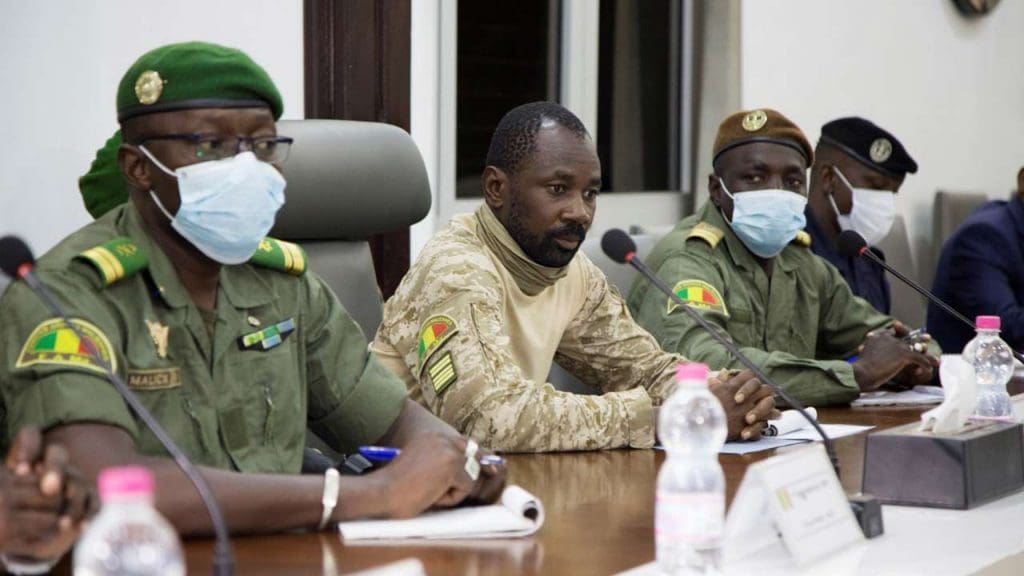Just after his official inauguration as head of the transitional state, the Bamako double coup architect appointed a civilian Prime Minister and promised to respect Mali’s international commitments, including the organization of general elections “at the scheduled time.”
It was a reassuring Colonel Assimi Goita who showed up Monday, June 7, at the International Conference Center in Bamako (CICD) during his official installation as President of the transition in Mali. “I would like to reassure sub-regional and regional organizations, and the international community in general, that Mali will honor all of its commitments for and in the best interests of the nation,” said the young army officer, who led two coups d’état in just nine months.
The first putsch took place on August 18, when the 38-year-old colonel, who was then commanding the Malian army’s Special Forces, deposed the embattled President Ibrahim Boubacar Keita (IBK), who had become very unpopular, along with a handful of young officers.
Colonel Assimi Goita’s second coup was carried out on May 24. On that day, the military arrested the transitional President Bah Ndaw, and his Prime Minister Moctar Ouane. They were taken to the Kati military barracks near Bamako, the traditional epicenter of putsches in Mali: They were forced to resign and eventually put under house arrest.
Colonel Goita and his military companions had justified this second putsch by accusing the Transitional President and his Prime Minister of “proven intention to sabotage” and “violation of the transitional charter.” This accusation was largely inspired by the coup leader and it gives him, as Vice-President, the right to control the composition of the government, particularly in terms of the functions of the ministers in charge of the Defense and Security portfolios.
It was a dispute with the ousted duo over these two posts that led to this second coup by the young colonel. The deposed Prime Minister had been reappointed ten days earlier, after he had handed over his resignation and that of his first government team. The new Cabinet he subsequently formed on May 24 did not include two Goita’s allies: Colonels Sadio Camara and Modibo Kone, whose dismissal was seen as a slap in Goita’s face.
The coup was immediately condemned by Mali’s partners and led to the country being suspended from the Economic Community of West African States (ECOWAS) and the African Union (AU). Without going so far as to close the borders with Mali or declare an economic and commercial embargo against Bamako, as many Malians feared, the two organizations demanded the appointment of a new civilian Prime Minister and respect for the democratic transition timetable initially set and which must be completed by 2022 at the latest.
With its 5,100 soldiers deployed in the Sahel region to fight jihadist groups in the north of Mali, France has gone further than the AU and the ECOWAS. On Thursday, June 3, the former colonial power announced the suspension “until further notice,” of its collaboration with the Malian army on the ground. Four days earlier, French President Emmanuel Macron had even threatened to withdraw his troops from Mali if there were “no longer any democratic legitimacy or transition” in that country, and should Bamako be tempted to go “in the direction” of radical Islamism, hinting at a possible rapprochement between the junta and the armed Islamist groups roaming the country’s northern and central regions.
Recognized by the Constitutional Court as Head of State since Friday, May 28, the young colonel is now officially sworn-in as President of the Transition.
Shortly after his inauguration on Monday morning, the new Head of State chose 63-year-old Choguel Maiga as Prime Minister, a veteran political figure in Mali for more than 20 years. Mr. Maiga, an engineer in telecommunications trained in the former Soviet Union has served his country at various duty stations, including several positions as minister. He was until his appointment, the chairman of the strategic committee of the June 5 Movement – Rally of Progressive Forces (M5/RFP).
This umbrella organization grouping political parties and civil society organizations is at the origin of the popular mobilization for the departure of the former president IBK and to whom Colonel Goita had promised the post of Prime Minister during a meeting with its leaders, the day after the second coup.
ARD/los/te/fss/abj/APA


